Grapes of Wrath
Hurricane Helene's Impact on Western North Carolina & Why It's a Catalyst for Sustainability in Wine
Dearest Modern Wine readers,
My intention for this post was to discuss the trends of summer alongside wine trends piquing my interest, recommending styles and bottles that exemplify carefree joy. That will be dropping in your inbox shortly because with everything going on in the world right now we could all use some joy (and wine). Instead I am using this forum to hold space for grief and wanted to do so with you, a community I value immensely.
The widespread devastation and destruction caused by Hurricane Helene has been hard to fathom. 800 miles, 30 inches of rain in North Carolina, 2 million homes and businesses without power, and over 200 lives lost with many more still unaccounted for. As these communities have slowly started to get power and service back I’ve learned that entire towns I’ve lived and loved in have been wiped off the map. These are mountainous areas where people can live 30 minutes from their closest store on a good day, many are under-resourced and under-funded by the government, and with economic losses coming in around $160 billion it’s hard to imagine what it will take to rebuild. From its breathtaking natural beauty to the warm hearted people that personify Appalachian charm, the Blue Ridge Mountains of North Carolina are truly a special place.
“The mountains are calling, and I must go.” - John Muir
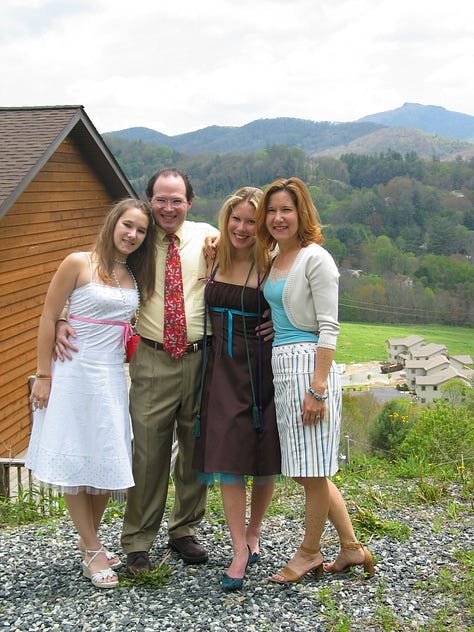
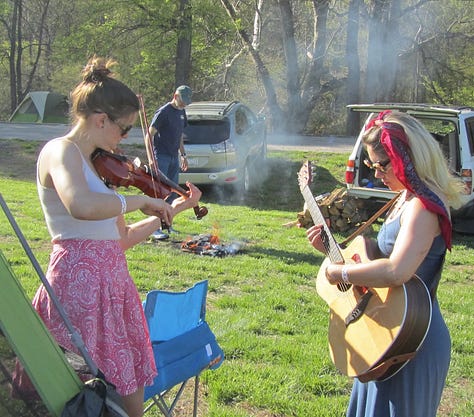
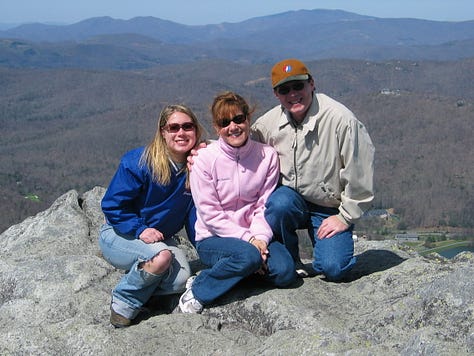
In the summer of 2002 I was restless and aimless, I didn’t know what I wanted from life and could have easily floated far away from home at just 17. Fate however, decided to keep me grounded and with the help of my family I found my footing up windy Highway 105 in the small Western North Carolina town of Banner Elk, population of roughly 1,000 salt of the earth human beings. I was accepted into Lees-McRae college and just like that, Southern Appalachia became my home for the next 4 years. There are infinite reasons why these mountains mean so much to me that I hope to one day share with you over a glass of wine, but for now I’ll share a tiny worm of one that sums up just how much magic these mountains hold. In October Banner Elk is home to the annual 'Wolly Worm' festival where we race fuzzy worms up pieces of string to see which one will predict the winter weather. This festival showcases how wonderfully unique Avery County is, a community that has always been so tightly knit we’ll use worms as a chance to get together and throw a party. Tragically, this October Avery County won’t be coming together over racing worms and funnel cakes, rather broken hearts and homes. If there’s one thing I learned living in Appalachia, it’s that mountain folk are built differently, they take care of one another regardless of circumstance and this tragedy will be no different.
“In the heart of Appalachia, the mountains whisper stories of struggle and triumph, of resilience and hope. They are the silent witnesses of a culture that thrives against all odds.”
Another town that is near and dear to my heart is Asheville, North Carolina, famous for its innovative music, arts, beverage, and culinary scene. I shared a bit about my most recent visit in a post last year when I began thinking about how and when it would be feasible for me to buy a home there to retire in one day. This past weekend Asheville was swallowed by the French Broad River, reaching over 16 feet in the River Arts District (RAD) that housed so many places I cherish including the sublime Plēb Urban Winery. I had the chance to sit down with the Plēb founders last year where we had a conversation that left me pondering big questions about wine. With the winery now gone, I’d like to share my thoughts with you as a small piece of the large legacy this space will forever leave behind.
Tension
We often talk about tension within wine, a push and pull, and that’s exactly how I've felt about my home state of North Carolina for my entire life. Even as someone with a deep connection to the state I fell victim to the belief that, we, and by proxy our wine, could never measure up. The American south is complicated which is how I’ve ended up living five thousand miles away but returning every chance I can get. It’s in our nature to exoticise, to look down at what is growing in our own backyard while we covet our neighbor's fruit. The south felt complicated to me, I didn’t understand what was happening, why people seemed to be stubbornly clinging to the past and reluctant to move on to an unscripted future. This is in part due to long established ways of learning, of what we’re taught in school and what our parents, grandparents, and neighbors passed along over block parties and bonfires. The same can be said for wine, where many of us who examine it academically do so from established institutions that tell us certain grape varieties and regions are better than others. During a recent trip to the Appalachian mountains, it hit me that our hesitancy to abandon these beliefs is severely limiting the future of what wine can (and will) be.
As an industry we’ve grown leaps and bounds challenging the status quo and breaking down biases but we have yet to fully extend this to considering where "good wine" can stem from. It has been widely established that many of us are skeptical to drink anything outside of the Vitis vinifera species (see below). It’s become easy to hate on hybrids (grapes that are created by crossing two different grape species, typically the European Vitis vinifera with American species like Vitis labrusca or Vitis riparia), which is extremely detrimental to the industry and the environment. As soon as something pops up outside of the framework we’re taught it’s easily categorized as lesser than. Instead of looking at emerging grapes, regions, flavors, and new ways of winemaking as something we just haven’t experienced yet, we’re too quick to judge them as flaws.
In exploring Plēb I was captivated by their mission to use exclusively local grapes, age in locally crafted concrete, and implement ‘meta-terroir’ like roasted hickory shagbark to soften their racy wines. Sure, this might seem wild or excessive because it’s never been done before but we have to remember that was the case for all wine making techniques when they were first implemented. Due to the humidity in the Appalachian Mountains, Plēb focuses on native and hybrid grapes so they can rely on organic and biodynamic farming. If they wanted to plant Bordeaux varieties, which are much more marketable and recognizable, they’d have to use heavy intervention during farming and winemaking because these grape varieties are not native nor hospitable to the Appalachian climate. The use of various additives and treatments to control the fermentation process, enhance flavors, and ensure the stability and safety of the wine are all things consumers say they don’t want, but are these same people willing to pick up a bottle of Vidal Blanc over Sauvignon Blanc?
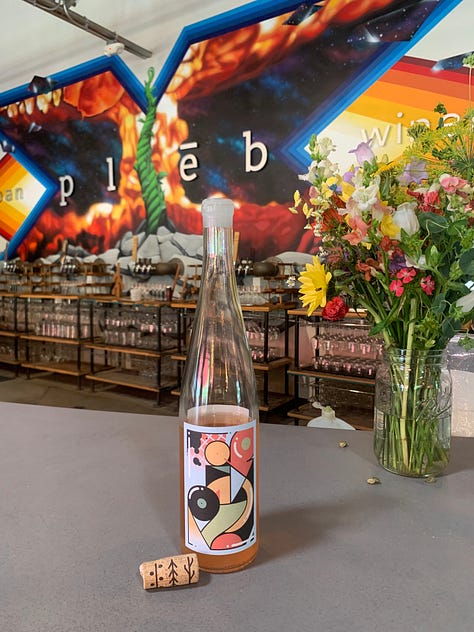
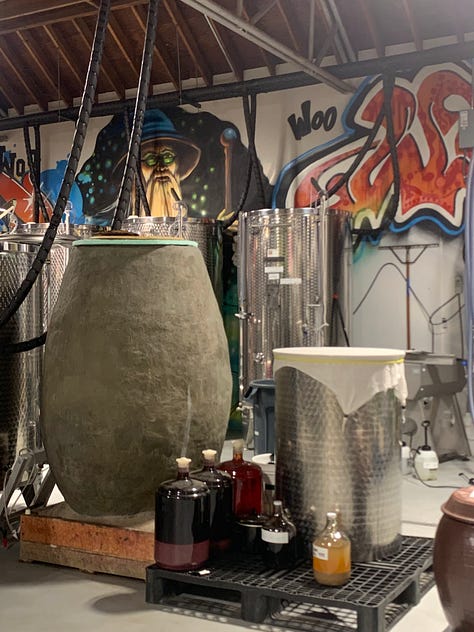
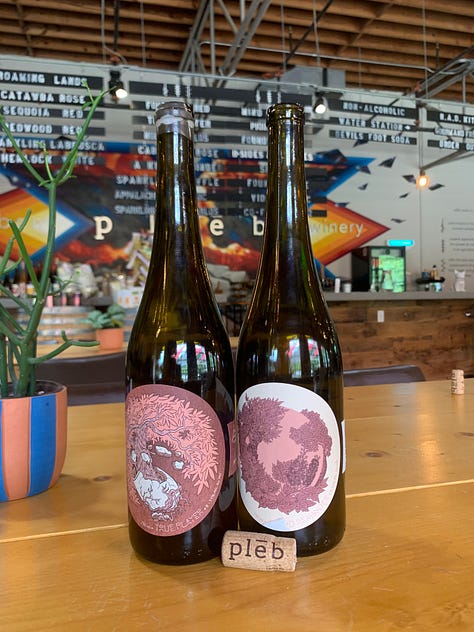
I began to wonder just how much of grape growing and winemaking was being steered by consumers? If consumers are dictating decision making in the vineyard and winery I felt more compelled than ever to help them make informed decisions. Much like a ‘Financial Advisor’ I think we could all benefit from a ‘Wine Advisor’, someone who has walked the vineyards and crushed the grapes to make a compelling case for hybrids and emerging geo’s whether it be driven by taste, sustainability, or simply expanding the current confines of what makes a great wine.
I think we’re reticent to admit that as well as being bias towards certain grape varieties we’re familiar with we are equally biased when it comes to which regions we deem acceptable to produce quality wines. If you were presented with a wine list that had Napa Valley and North Carolina sections, I’m pretty sure I can guess which one you’d choose. Even those of us who are native to these areas fall victim to this, a self-hatred we fulfill by not truly letting ourselves open up to enjoying, living in, and appreciating wine from our own backyard.
With marketing, consumer trends, and capitalism informing what wineries grow, buy, and sell, winemakers are pushed farther away from their passion, their moral obligations to the land, and what should be growing on it. This leads winemakers and wineries to make compromises for their business that may be unsustainable and hinder them from achieving their greatest potential. We see the business side start to push them away from their original morality instead of asking what they could be capable of if they weren’t restrained by these boundaries. Plēb was a winery that chose morals and sustainability above all else, an inspirational role model that not only advanced North Carolina viticulture but viticulture as a whole. They were totally badass and will be deeply missed by many.
If you’re a fan of Modern Wine you’re a critical thinker so I’m going to leave you to ponder some wine thoughts. There’s no denying that climate change significantly influenced Hurricane Helene intensifying it’s impact in several ways. From increased rainfall, stronger winds, intensification from warmer sea surface temperatures, and the very obvious wide reach (Asheville is a shocking 277 miles inland from the closest ocean coastline), this was an extreme weather event brought to you by fossil fuel and industrial pollution. Many of us already make smart decisions in regards to how we interact with mother earth and we can expand those decisions to our wine consumption. I challenge you to get curious, look into the farming and sustainability practices of the wineries you purchase from. Are the vineyards they source their fruit from using organic and biodynamic farming practices? Are they being mindful about which grape varieties are indigenous to and grow well in their climate (even if they are weird and hard to pronounce); or are they forcing Pinot Noir to grow where it doesn’t want to grow through a concoction of chemicals because they know the name will grab your attention? I realize these are big asks and add to the already confusing process of buying wine that I’d like to help simplify for you. My intent is to follow up with a post demonstrating what to look for on the label that will help you make more informed decisions. Until then, reach out to me and remember we all have the world wide web in our pockets where the Copilot app can step in and be your intermediary ‘Wine Advisor’.
Thank you all sincerely for being a part of the Modern Wine community, being away from home is extremely difficult in moments like these and sharing how I’m feeling with you is a great source of comfort. As my friends in Western North Carolina slowly get back on their feet our Lees McRae College motto feels more significant than ever - "In the Mountains, Of the Mountains, For the Mountains". My heart goes out to those "In the Mountains" still searching for loved ones and those of us "Of the Mountains" who have spent time tucked away in the hollers now feeling helpless from afar. More than ever we must all remember to be "For the Mountains" hand in hand, taking steps down the long, winding, mountain road ahead as we pull together to rebuild these culturally rich communities.
If you’d like to support the team at Plēb please consider donating here - Support Plēb Urban Winery’s Staff and Beyond
Stay safe and please take care of your mind, body, and souls during these difficult times 🥂 xx











What a beautiful passage about our N. C. Mts. that we all know and love you have written. Thank you for honoring them, and as you said they are strong and will fight together to get the life they enjoyed back together. Much love, and prayers are being sent their way. 🥰